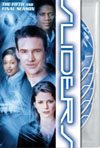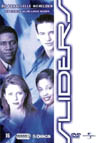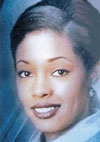Added to this is the intrigue of her shadowy mentor Dr. Oberon Geiger, who comes back for a second appearance and makes his presence pay off with many terrific scenes as an excellent and slightly ambiguous antagonistic force. Peter Jurasik is in fine form once again, helping to make his character formidable and memorable, and able to discuss and debate both the scientific aspects of a story and its moral implications. Everything you'd want in a good recurring villain. Excellent.
"Why do you assume she would want your life anymore than you would want hers?"Rembrandt is probably the most overlooked regular character in this story, but he does get some nice scenes of sharing his wisdom and experience of sliding with the rest of the team. The best scene for him is undoubtedly the one he shares with Diana, when he gives her the bit of advice quoted above. That is good stuff; the very thing that escaped Professor Arturo and those who wrote for him back in "Eggheads" (Sliders story no. 6), and it demonstrates that the show is learning from its past and growing well.Maggie is also shown to grow in understanding and tolerance in the way she looks at Mallory, and how she deals with the life she had with Quinn both as a Slider and in the bubble universe in "Roads Taken" (story no. 67). There's a lot of good stuff there for Maggie, and it makes a nice little side plot. And once again, just as was the case with the last episode, I think this episode easily holds my attention because the A-plot goes into university labs and grapples with the science and physics related to sliding - the very things that the original four characters would have loved to find and do, and which they encountered and dealt with too seldom for my tastes.
Quinn vs. MalloryAs for the negative points, there are a few doozies here. First off is pretty much everything concerning Mallory. When regeneration succeeds on "Doctor Who", the new Doctor's second story typically has the character charging full speed ahead into an adventure, displaying all the archetypal strengths of curiosity, technical wizardry, and heroics that make him a success, no matter who is playing the part or with what minor personality quirks. Here in Robert Floyd's second "Sliders" story, they've gone back to wallow in what is often known as a "regeneration trauma", something which is never a great viewing experience for audiences during a new Doctor's first story, and something they'd done fairly well at skipping over in "The Unstuck Man".But "Sliders" is taking things much further into bad territory by defining and insisting on perpetuating a split personality war between old Quinn and new Mallory. Floyd's most poignant moment in the story is the one where he storms out of the car from the holographic prom date with Maggie, demonstrating how rejected Mallory feels. As much as that makes a great scene here, it doesn't justify what season five is otherwise screwing up. The last story worked well because Robert Floyd demonstrated he could pull off an effective leading Quinn character. This story gives the audience Quinn's memories, but nothing of Quinn himself other than a gunshot wound that means nothing to anyone. The Mallory character here really is nothing but a McGuffin for the others to worry and fuss over. He motivates the plot, but does nothing himself to act upon it. And if the audience is being asked to settle for a wimpy whiney character that replaces Quinn, and asked to "get over it" the way Maggie is asked to, why did we bother to "regenerate" the character in the first place? We could have just dropped Quinn and Colin off somewhere, given them a happy exit from the show, and picked up Mallory as is (preferably with his own unique name this time). And that would have saved us from incurring a narrative debt that the writers couldn't repay without re-signing Jerry O'Connell during production, which proved to be outside of their control. What should have happened here is for the viewer to get the real old Quinn Mallory out of Robert Floyd. He is going to want to explore the lab and the hologram technology; he is going to have some theories to add to Diana's, and he's going to want to be involved in the later heroics and contribute to the story's resolution. And all the good questions surrounding his relationship with Maggie are still valid and can still bite. They tried to imply such difficulties between Rose and the Doctor when he changed from his Christopher Eccleston form to his David Tennant one, but with the existence of any romance between them being so utterly ambiguous, and with half of the audience (myself included) not wanting to invest in it anyway, such an idea had no power. "Star Trek" came close to dealing with this kind of phenomenon in many of its Trill episodes, but can't really be as powerful when done between a regular and a guest star, and of course usually had the added complication of gender swapping. Even with the Worf-Dax pairing enduring a change of actress for Deep Space Nine's seventh season, there was still a bit of a triangle there with Dr. Bashir, and I was never that invested in seeing Worf's emotionally restrained side triumph. For my money, the Quinn-Maggie version of the phenomenon here seems to have the potential to be the most heartfelt one, the one I'd invest in the most, especially if it is old Quinn we still get to see. Maggie's worthy arc in this story can still be just as powerful with our old Quinn getting his due in the story. Sacrificing all that just for one moment of Mallory storming out of the car isn't quite worth it. And using Maggie's arc to help viewers accept a leading Quinn Mallory character played by Robert Floyd would have been a good thing to do. As it ends up here, she enters dangerous territory if she's merely going to heighten viewers' awareness that they don't have the Quinn they'd want anymore - this could easily drive loyal viewers away from the show, and may indeed have done so. Another point we will want to continue to follow as season five plays out is something viewers could only really get this early on from reading story editor Keith Damron's Year 5 Journal on the internet. They actually devised a whole new function for Robert Floyd's Mallory character that should dictate how he is used in the scripts, which is that he has abilities as an adaptable, fast-talking con man who will help them procure any resources they need on a world, or perhaps verbally get them out of trouble. This is a great character type to have on a show like "The A-Team", but will it be of much use in the more sci-fi oriented stories we see on "Sliders"? Well, we can at least point to some of the potential. Good verbal bluffs often become a most enjoyable part of climactic heroics in Doctor Who stories, with good examples occurring in tales like "Frontios" (story no. 133), "The Krotons" (story no. 47), or "Meglos" (story no. 111), and here in "Sliders", scenes like the one wrapping up one of the two main plots in "Slide by Wire" (story no. 62) that called for Quinn to pull off such a bluff might just have been more suitable for Robert Floyd's performance than Jerry O'Connell's. Plus, these new functions are a great "plan B" to fall back on if the re-split happened and we suddenly found both Jerry O'Connell and Robert Floyd continuing together as regulars on the Sliders cast, as they would both have unique areas of contribution. In any case, these new functions do not make any kind of debut here in "Applied Physics". Mallory procures neither the holographic device nor anything to aid Diana's research, and none of his fast-talking lines impress anyone, particularly not Maggie who is revolted by him. No luck for the new functions today, as we are denied both old Quinn and the intended new Mallory, and get nothing but the disappointing whiney McGuffin.
Applied Brain CloudSomething else that eats into the story's rank is the clueless way that the script tries to scientifically explain away Diana's big screw-up three-quarters of the way through the story. Chris Black seems to be attempting to pull off a time travel re-write while staying in the same universe, which grates against the premise of the show. Need a new world with similar characters and situations to the one you've been watching for the last 37 minutes, except with a history that diverged slightly in the past? Great! On this show we do that by SLIDING between one version and the next, which both continue to exist in their own parallel/branching universes. I'm prepared to say Diana found a new way to achieve that with the equipment she was messing with, which is additionally plausible since she was looking to do something involving parallel/branching universes anyway. It is highly convenient that she manages to take herself and her three fellow Sliders with her on this journey since they are spread out all over the city and mingled with a million other souls who do not slide with them. Of course, Geiger is everywhere in ways we don't fully understand, so of course we see him come along for the ride too. One extra bit I would have loved to see in the final act is that, because we're now in a different parallel/branching universe with a different relation to the spiral helix constants, the countdown on the timer should be a completely different number. Failing that, as was the case in "Invasion" (story no. 22), if the number on the timer stays the same, the Sliders should need to return to the world they were on previously, where the local Diana has a daughter, before they can slide out.If only that were the only thing wrong with the hokey explanation that does come out. Apparently Diana thinks she's done this thing with some kind of DNA splicing on her alternate's daughter's father. Caveats include the idea that gene splicing is best done prior to or just after conception, before the first cell divides in two, otherwise you have to make identical DNA edits in EVERY cell of a body simultaneously which is a huge headache. So applying this kind of surgery requires a time machine, while the intent from the script as written seems to be that it is something she does completely in the present. Additionally, you'd never get the effect seen here unless this is done far enough in the past that it predates the alternate Diana's first meeting with the father anyway. But this is also playing on the unchallenged assumption that the father's choices in life were largely motivated by his DNA, which is something I don't often buy. Exactly how drastically did Diana change him? Did she turn him into a woman, or otherwise sabotage his natural hormone production? Too much speculation here won't leave her character looking very sympathetic. Better to say she just found a new way to slide, and didn't quite realize it. Most of all, the story feels like it simply hasn't resolved what should have been its own self-contained narrative debt. As great as it is to get a third version of Diana in the final act, what we really want is to get back to the second Diana and her daughter, and see our Diana appreciate the value of the choices that the second Diana made in pursuing a relationship and having a daughter. This seems to be a clear case where I think the audience would care more by seeing this than by mooning over the loss of such things, and a clear case where that most blunt of writer's tools in creating loss proves less effective, additionally so since the methodology of the loss makes so little credible scientific sense. As good a ride as this episode has been, I think it's a little too complacent in running away from a half-finished job in the end.
This story has become available on DVD. Click on the Amazon symbol for the location nearest you for pricing and availability:
Comments on this article are welcome. You may contact the author from this page:
|




 A
A


